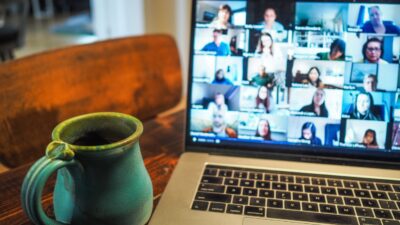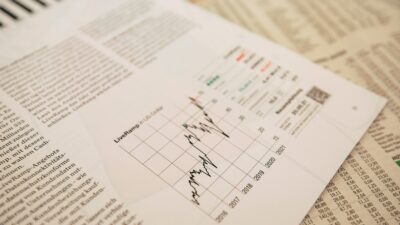Sandra Peter, Kai Riemer and Andrew Baxter

Smart brands and marketing on The Future, This Week
This week: what smart brands can do during the crisis – a special with Andrew Baxter. Sandra Peter (Sydney Business Insights) and Kai Riemer (Digital Disruption Research Group) meet once a week to put their own spin on news that is impacting the future of business in The Future, This Week.
Our guest this week: Adjunct Professor Andrew Baxter
The stories this week
01:51 – How smart brands build their reputation during the crisis
16:27 – Advertising is getting crushed by COVID-19
Other stories we bring up
Andrew’s article in The Australian
Gin distilleries around Australia are producing hand sanitiser
Google is planning to slash its marketing budgets by as much as half
Netflix gets 16 million new subscribers
It takes 66 days for a new behaviour to become a habit
Mike Seymour’s insight on the state of the film industry
A guide to advertising best practice in recession
Report on marketing in the era of accountability
Marketing effectiveness in the digital era (see page 16 for share of voice)
10 insights from the wide-ranging research into IPA Databank cases
Balancing Short and Long-Term Marketing Strategies
Ten charts on marketing effectiveness
You can subscribe to this podcast on iTunes, Spotify, Soundcloud, Stitcher, Libsyn, YouTube or wherever you get your podcasts. You can follow us online on Flipboard, Twitter, or sbi.sydney.edu.au.
Our theme music was composed and played by Linsey Pollak.
Send us your news ideas to sbi@sydney.edu.au.
Dr Sandra Peter is the Director of Sydney Executive Plus and Associate Professor at the University of Sydney Business School. Her research and practice focuses on engaging with the future in productive ways, and the impact of emerging technologies on business and society.
Kai Riemer is Professor of Information Technology and Organisation, and Director of Sydney Executive Plus at the University of Sydney Business School. Kai's research interest is in Disruptive Technologies, Enterprise Social Media, Virtual Work, Collaborative Technologies and the Philosophy of Technology.
Thought leader, marketer and board director, Andrew Baxter is the Senior Advisor at KPMG's entrepreneurial Customer, Brand & Marketing Advisory business, a Senior Advisor at BGH Capital, as well as the Adjunct Professor of Marketing at the University of Sydney, and a Non-Executive Director at Australian Pork and Sydney Symphony Orchestra.
Share
We believe in open and honest access to knowledge.
We use a Creative Commons Attribution NoDerivatives licence for our articles and podcasts, so you can republish them for free, online or in print.
Transcript
This transcript is the product of an artificial intelligence - human collaboration. Any mistakes are the human's fault. (Just saying. Accurately yours, AI)
Disclaimer We'd like to advise that the following program may contain real news, occasional philosophy and ideas that may offend some listeners.
Intro This is The Future, This Week on Sydney Business Insights. I'm Sandra Peter, and I'm Kai Riemer. Every week we get together and look at the news of the week. We discuss technology, the future of business, the weird and the wonderful, and things that change the world. Okay, let's start. Let's start!
Kai Today on The Future, This Week: what smart brands can do during the crisis, a special with Andrew Baxter.
Sandra I'm Sandra Peter, I'm the Director of Sydney Business Insights.
Kai I'm Kai Riemer, professor at the Business School, and leader of the Digital Disruption Research Group. So Sandra, what are we doing today?
Sandra Well, today we thought we'd get some help. We were gonna tackle marketing and we thought we might just bring in someone who knows what they're talking about.
Kai And who has been on the podcast before. So we're welcoming back Andrew Baxter,.
Sandra Andrew is, of course, an Adjunct Professor of marketing at the University of Sydney, but also a senior advisor at KPMG. And he's been previously the chairman of Publicis Communications, which is one of Australia's largest comms and marketing businesses. And of course, he also holds a number of prominent board roles. And we're really happy to have him with us today.
Kai Welcome, Andrew.
Andrew Thank you. Great to be here.
Sandra We're hoping Andrew can help us discuss what's happening in the marketing space. We've tackled so many topics over the past few weeks, most of them to do with COVID. But this is a space that we haven't really explored. And the story gets quite complicated on whether you're doing something during the COVID crisis, or as we're coming out of it, or even when the pandemic has passed.
Kai So why don't we get started then? So Sandra, what happened in the future this week?
Sandra Our first story today is around brands on how smart brands use a crisis to build their reputation. And the story was first published in The Australian. It now appears on Sydney Business Insights, and was written by no other than Andrew, so we might let him tell us a little bit about it.
Andrew It was a really interesting one to write. What I unpicked was there's almost a three by three matrix of what brands should be doing, because you've got three phases of what's happening with COVID. You did have that initial crisis of the pandemic and how brands reacted. Then there's a period where we're living with COVID, and how do brands react in that period of time? And then there's planning for the recovery out of COVID. So there's sort of three main phases. And then you've got three types of brands. You've got brands that unfortunately are now hibernating, you know, brands like the airlines, some of our sporting codes, some of our performing arts organisations. Then you've got brands that are declining but surviving, retailers that are switching everything to online. And then you've got the booming brands like supermarkets. So if you can imagine a three by three matrix, that's where you've got to start from a marketing point of view as you're thinking through what your brand should or shouldn't be doing. And the article spends a fair bit of time discussing that first phase, the original crisis, and how brands reacted to the initial pandemic.
Sandra We've seen some interesting things happening in Australia. I mean, I bought hand sanitizer from a gin company that repurposed its production lines.
Andrew That was great. There was a lot of companies, there were Four Pillars Gin here and Archie Rose, I think, were two of those types of businesses that reconfigured their manufacturing lines to make hand sanitizer when it was running short. And LVMH were the first to do that in a big way, in France, and they provided those free of charge to all the hospitals. So I think brands that acted really authentically and with purpose, and just were quite genuine about the community that they were part of and the customers and their employees, did really well through that pandemic phase. A couple of the clothing manufacturers, Zara was one of the big ones, a big global clothing retailer. They repurposed their factories to make masks and hospital gowns. You had things like Subway and Uber Eats in the US offering free delivery to health workers. And one of usually once was some of the companies that own supercomputers all got together, the Amazons, Microsofts, IBM, Googles and put those together to help fast track all the research around the vaccine and any drugs that might be required.
Sandra Interestingly enough, just this morning we did an interview with the senior VP from IBM talking about just how they repurpose their supercomputers to help the fight. So that'll be coming out next week.
Andrew Yeah, that was a great initiative by them all. And then there was other brands who might have had a whole lot of advertising planned, and they actually repurposed that to provide health and safety messages. Coca-Cola did that, Nike did it, I mean Facebook did a huge small business community fund, there was hackathons going on to help. So a nice rally around of brands just acting authentically, trying to help at that moment in time.
Kai Andrew can I just cut in there and be devil's advocate just for a moment. Some of those seem really genuine initiatives to help with fighting the pandemic. But some of these products you have perfume-scented hand sanitizer, you have gin-flavoured hand sanitizer. Is there not a risk that the general public might say that these companies are just using this for marketing stunts? This is a health crisis. People are dying. And, you know, well-off customers who are sheltering in their houses buy expensive scented hand sanitizer products. Does this really help, or could this not backfire in the eye of the public?
Andrew LVMH, what I liked about them is they didn't charge anything for it, they just gave that product to the hospitals. Everyone knew there was a bit of a panic on, that there wasn't enough hand sanitizer going around for everybody, let alone hospital staff. And they didn't talk about that. From what I read for about 10 days, they just did it and then it came out. And I think that's when brands are acting very genuinely. I think to your point, if brands are doing it the other way around talking about we're going to do this, then they're trying to drive a bit of publicity. But I think people were really worried in those early days, are very worried about those hospital workers who might not have masks or gowns or hand sanitizer. And I think credit to some of these companies who rallied around quite quickly.
Kai Yeah, I agree. I'm just saying that sometimes it's walking a fine line, and controlling the message and making sure that you're seen for what you're actually trying to achieve with this is still a challenge, isn't it?
Andrew It is. It is, I think, jumping on the bandwagon a bit too late. Consumers are pretty smart, they see through some of these things. And one of the things that's come out of all this is are some companies pushing too many messages about COVID out there, in terms of email inboxes?
Sandra Well, I certainly have received a lot of Qantas emails, even though I'm sure not to fly anywhere for probably the remainder of this year. And I now know everything about what Nike is doing in their facilities to make sure employees and customers are safe. And every single other brand has been giving me advice on how to stay safe. So there can be a bit too much.
Kai But Andrew, what do you do, right, when you're a brand whose business has just been put into forced hibernation because you just can't do your business, but you still want to keep and connect with your customers, and you're in an environment where many such brands want to do this. All of a sudden, people's inboxes are flooded with well-meaning messages. And each one of those messages might be well and truly useful on their own. But when you get 20 of those in a week, from the customer point of view, it starts to really become overwhelming.
Andrew It does, though. Certainly quite a few articles in the marketing trade press written out of the UK, US, here, around people going overboard in that they are a bit sick of brands being overly empathetic. I think early on there was definitely a legal reason and an empathetic reason to go out there and say, 'look, we know we have done everything possible to make sure that if we're selling something to you online, that we're maintaining all of the health measures that are required'. But you're right. There came a point where people just felt inundated. For brands that are in hibernation, as we talked about before, the airlines and things like that, you do want to maintain a presence. There will be a time when your brand needs to come back and people will start buying you again. But like any of these things, you need to be really locked-in to what your consumer's needs are. And I think there's been quite a lot of research from certain companies in this period, where people are really trying to understand how consumers are feeling, the sorts of messages they are willing to receive. And I know some of those sporting organisations and performing arts organisations, they obviously can't play in front of the crowds they normally would, but they're doing content every day that's different. You know, the Sydney Symphony Orchestra, and I'm lucky enough to be on the board there, one of the members of the orchestra each day is doing a recording at home in their bedroom or their lounge room, and putting it up to continue to provide music for those people who're longing to get back into the Opera House and listen to the orchestra play. And I think when you're doing different things every day, and they're more meaningful and they're quite targeted in certain ways, then I think people are far more open to those sorts of messages. But those hibernating brands have got a real challenge because they've got no budget, they've got no money right now. And they've really just got to use those owned and earned channels as best they can to get their messages out there.
Sandra And we're also entering now a different stage of this pandemic, especially here in Australia. We're well and truly in it, there’s not the mad panic that we had at the beginning, but we've all settled in into the lockdown, we're all settled in into working from home. How do brands pivot at this point?
Andrew I think this time period is about some prudent cost-cutting, because certainly if your revenues have been declining as part of this, that you need to be cutting costs accordingly. But it's a time also for smart investment, and it's also a time to be quite tactical and agile and extremely customer focussed. If you think about some of the restaurant and cafe brands. I saw last week Grossi Florentino, one of the most famous restaurants in the country down in Melbourne. Guy Grossi and his family, they obviously haven't been able to open their restaurant, but they've pivoted to an online and home delivery service. Now, they've never done a home delivery, but you can now get their tiramisu, which is to die for, for $20 delivered to your home in Melbourne. And I think it's those sort of pivots that companies are needing to do. And clearly on a bigger scale, the retailers have done that. And there's a lot of retailers that have unfortunately had to shut their stores temporarily. Brands like Mecca and Uniqlo here, Myer, Aesop, Wittner, some of the results are coming out on the online sales as people shift across. And I think Super Retail Group came out and said that their online sales were up by 145 per cent in the first few weeks of COVID. So, if people are still looking for those products, those businesses had to really quickly pivot. And some digital transformation projects that were winding along have been really fast tracked through this time period so that people can still access product if they need it.
Kai I think we've seen some really interesting initiatives, especially in the restaurant, in the hospitality business. We're getting bread delivered now to our house so that we don't have to go out and buy bread, by a company that is actually a wholesale delivery company that normally delivers to restaurants who lost most of their business and they have no temporarily pivoted to delivering to people's houses, and they deliver baked goods and things like that. We've seen even the shops in local petrol stations list their products on Uber Eats so that you can now order milk and bread from your local petrol station via Uber Eats, in a desperate attempt to make up for some of that lost business that they normally get from people buying petrol, which is also not happening.
Andrew Well, I think also that whilst those businesses are pivoting as fast as they can, it does come back to customer needs. You want to keep buying your bread. You want to get your milk as easy as possible, whilst staying safe. So I think these businesses that are very customer focussed, and have been able to pivot pretty quickly, have come out of this in a reasonably good way.
Sandra Can we turn our attention a little bit to some of the businesses that really have been booming? I mean, companies like Netflix have done exceptionally well during these times. They've added millions of subscribers, people are watching more than ever, and they're doing extremely well. And there has been, especially from companies like Netflix, there has been almost a reticence to talk about it, to brag about how well they're doing in a time of crisis. To what extent have we seen consumer behaviour and media consumption habits change?
Andrew That Netflix number is huge. In the first quarter, compared to the same quarter last year, they're up twenty two and a half per cent on subscription numbers, I mean that's massive. And I saw that somewhere like Singapore are up 60 per cent on online video consumption, and the UK has got a similar amount, I mean Channel 4, one of the better stations over there, is 37 per cent up. I think TikTok's 18 per cent up, and Facebook usage was up 50 per cent at one point. So there's been a big shift and there's probably been never a time where there's been more, the old fashioned expression in the media world's been 'eyeballs', are always chasing people's eyeballs or ears to listen or see the advertising or the media. And there's never been more people in front of screens than ever before. But unfortunately, you know, it's tough times and a lot of companies can't afford to actually advertise at the moment. But there's some mediums that have really suffered, I mean cinema. You can't go to the cinema, so there's no cinema advertising The outdoor industry, I saw some of the traffic results in late March I think it was, Melbourne and Sydney, the traffic was at 20 per cent of its normal levels for this time of the year. So you've got only 20 per cent of the cars and trucks going past the billboard. So there's unfortunately been some industries within media that have been affected, and there's been others that are doing really well from radio and TV, I mean, the US daytime TV is up like 15 per cent or so. So who would've thought daytime TV would have had a big hike? So I think for any brand, they've really got to keep a close eye on where those customer media habits are changing, and where any of their media habits are changing. There's been a great piece of research that was done in London toward the end of the 2000s that shows that habits form and 66 days. Now we're probably into day 40-45 of this crisis. And brands need to be thinking about are they happy with how some of those media or consumption habits are changing or not, and how it might they affect those as we go through? So it's certainly unbelievably fascinating times, from a marketing point of view, with those curious marketer hats on trying to really move quite fast to take advantage of some of these shifts.
Kai Andrew you mentioned cinema, and one of our colleagues, Mike Seymour, has a piece on the SBI COVID portal on what it means for companies like Disney, for example. Disney's subscription service is certainly up by a huge margin, much like Netflix. But at the same time, Disney as a studio, as a production company, they have movies that are done that cannot be released to the cinema, because they're now closed. So now we're seeing a golden rule of that industry being broken, that big productions appear on streaming on the small screen before they've seen the big screen. So there's a huge shift in that industry as well. Do you have any insights on that?
Andrew Yeah. Interestingly, Trolls, the movie, they decided to launch that one. A lot of the movies like the next James Bond and a few others all got pushed back to the back half of the year, but they decided to launch Trolls. And I read earlier this week that it's had $100 million of sales online of people buying the movie, and the last time they had either in that franchise or a similar franchise, it had taken five and a half months of cinema to get to that number, whereas it took like a couple of weeks online. So it could disrupt this whole industry.
Kai Yeah, you mentioned that habits might change, so business models might change. We might actually come out of this with some industries being permanently transformed, not just in terms of customer habits, but also in terms of entire value chains.
Andrew I agree, and I did see another article that mentioned one of the big cinema chains in the US was not happy that this has all happened, because clearly they're worried that these sorts of habits might change. I mean, I still think, you know, we had these arguments about books 10 to 12 years ago with the onset of Kindle. And, you know, people will all rush to do that. I think people still like some of the tangible enjoyment parts of either reading a book or actually going to the movies with someone, or a family member, and watching something on the big screen. But you're right, there'll be a percentage of an audience that will switch across. I mean, someone asked me the other day about will this mean more people switch toward buying Australian only, for example. And there's a global study by Nielsen that talks about the fact that globally about 11 percent of people pre-COVID were already locked onto only buying in their country. But there's something like 54 per cent who buy mostly local. And I do think that there'll be shifts like that where we realise that all of a sudden, you know, our farmers and some of our essential services, you know, their worth has been heightened, rightly, through this crisis. And they're probably back in a position where there's a huge amount of respect for a lot of those people. And I think we will see some of these shifts coming forward.
Sandra Let me take this opportunity to try to look forward a bit more, because I think one of the issues that you've phrased in your article, and it also comes up in one of the other articles we wanted to discuss today, is how much should we spend during the crisis as we move out of the crisis. So keeping in mind that this will pass at some point, and that brands will need to come back stronger than ever if possible. As the Barron's article makes quite clear, advertising is getting crushed at this point, and not even Google or Facebook are keeping their marketing budgets intact. How much should companies be spending?
Andrew All the research points to actually looking at your competitors and outspending them. So a whole category might pull back their spend. But when you look through there's some research done after the 1991 recession and those that maintained or invested more in advertising, for example, during that, they had a five year sales advantage of 25 per cent over their competitors who didn't do that. Apple continued their R&D into iTunes and their mini iPod through the dot-com boom. And guess what? They then launched those products on the other side, and they were huge successes. Kindle was launched in the middle of the GFC. So there's a lot of evidence that shows that if you can outspend your competitors in particular, if you can continually maintain that investment, there is a likelihood that you'll come out the other side in a much stronger way. But clearly, there's brands that are hibernating that just can't do that. But could they not outspend, but out-market in these downtimes, their competitors, with minimal budget? Some of the things they need to be thinking about. But it's also a time where you can fast track some projects if you have got enough cash there. You know, if you're looking at upgrading your digital platforms, or re-evaluating your distribution channels, or looking at how pricing might be affected before or after, or figuring out a better customer experience, I mean, these are moments in time where you've got a tiny bit of downtime where you can throw some teams at these projects that have been getting put off for a while.
Kai So what I hear you say is that we're in a situation now where online traffic is up, so exposure is really good in the online channel, demand is down from competitors, prices for ads are down. So there's now real opportunity for companies to use some spending at least to remain in the customers view, and then come out of this crisis stronger than before.
Andrew And Binet and Field, who've done a number of studies in the UK, particularly around the advertising, and this is regardless of COVID, and they've highlighted that if you can outspend your competitor in advertising by 10 per cent from a share of voice point of view, then you get a 1 per cent market share gain. I think in the years gone by, we haven't had enough proof around some of this. Interestingly, brands like P&G and Pizza Hut have come out and said that they are really going to keep pushing on their marketing and advertising. And brands like Coca-Cola have said, look, we know we're not seeing that short term ROI, particularly through that retail trade than the food service trade, so therefore, we're pulling back on spend. And so it does come back to your situation. But if you can out point your competitors, there's probably never been a cheaper time to out point your competitors, if that make sense.
Sandra Is it different this time around? If we're looking at crises that we've had before, first of all, digital advertising wasn't a big deal. Even during the GFC, it was still a relatively small part of the overall spend for most companies. Now it's maybe half the spend of companies. And also the length of the crisis or the vastness of it, it's pretty much every major economy now and every emerging economy is getting hit by this, and most likely we are going to be seeing a depression. Is it different this time around?
Andrew There's no doubt about the fact that this is different, and this seems a lot deeper. I think the fundamentals of marketing and the fundamentals of business have to be looked at. I often say that the fundamentals are taught brilliantly at university, but obviously in a marketing and digital and tech world, how you execute those are changing all the time, and they're being fast tracked even through this crisis. So, look, I think it's certainly a tough time for many, but there's certainly a lot of evidence from, you know, World Wars to the Great Depression to the GFC we've talked about to the dot-com boom, to the early 90s recession. There's been enough learnings that people need to be looking back on and seeing if they can take those learnings into their category, and that environment that they're in, and get an advantage.
Kai How is the advertising supply chain, the people selling the shovels, so to speak, how are they going? The agencies, those who help brands get their message out. How are they coping with the challenges presented? Are they hibernating while they're pivoting? Do they find new forms of marketing that they help with?
Andrew What we're seeing, and if you look at the bigger agency holding groups and some of the consulting firms, because they're large and they've got quite a diverse portfolio of businesses within them, they might have advertising agencies, digital agencies, media agencies, activation agencies, PR agencies, et cetera. We're seeing, depending on their client mix, because it does come back to clients, if you've got too many of those hibernating brands and obviously that spend's been cut into your agency or your consulting firm. So in general, here and around the world, there's been sort of 10, 20, 30 per cent staff costs. So that shows some of the revenue impacts that they might have had. And I'm sure coming into this next quarter, April through to June, that's going to be potentially even tougher as some businesses have been highlighting, because like a couple of the big listed global companies are saying that they're not going to release results through these periods, they're going to hold them off. So it's clearly been affected. But, you know, there's some businesses like the crisis management type PR firms have been doing really well through this, you know, some of the research companies have done quite well through this. Businesses who are closely aligned and do a lot of work for the government who've never been busier and never moved so fast, are doing okay. But then if you've got a business that potentially might be I don't know, an activation and events businesses primary thing is to build big activations at, I don't know, AFL grand finals, NRL grand finals, the Grand Prix, etc., well those sorts of businesses, unfortunately, are in a really tough spot because some of those events just aren't happening. So it really does depend on the mix of clients you've got within your organisation and also the mix of businesses that you have. I think many are being resilient, I think people moved quite quickly. There was enough memory from the GFC and many of those companies to know that you needed to move fast to make sure that you shored up your business and you are genuinely helping your clients who are going through potentially huge crises at their end.
Sandra Before you wrap up, there's one more category of marketers who really didn't get much attention in the media yet, but that's influencers. And we've seen a few of these categories completely disappear, travel influencers, travel bloggers have gone away, restaurant bloggers, the ones who used to go to exotic locations and give us the best of the best have gone. But some of them are actually doing quite well and prospering, fashion bloggers and makeup bloggers.
Andrew There was a great story in China where, I think it was Loreal who had a whole lot of beauticians and makeup artists that are normally in stores, and I can't remember which chain of stores it was, but they very quickly turned them all into online bloggers and influencers. There was about 200 of them. And the online sales of those products went up enormously. So, again, you're right, if you're in the travel and tourism industry, not so good. But if you're in that beauty, fashion, home cooking, you know, I've seen a lot of the top chefs having a lot of fun, some of them with their families, on their Instagrams, cooking something different every day and providing a bit of entertainment. And I was talking to a couple of the large influencer platforms in the last couple of weeks. And it seems like, yes, they've been hit, but not as badly as you'd think because there's been, to your point, the upside of this and the downside in different categories within blogging and influence of marketing.
Kai Do we see any new forms of influencing emerge off the back of this crisis?
Andrew Yeah I think. So just picking up on that home cooking piece. I've seen a lot of the top professional chefs, guys like Colin Fassnidge who's on My Kitchen Rules, and he's done some great stuff online. And I've seen Adrian Richardson is one of the top chefs and restaurateurs down in Melbourne with La Luna. All of a sudden they've been really prolific, in a good way, on some of those social media channels. So I think we've had a lot of mums at home blogging about cooking in the past, and dads as well, there's categories around that. But I think this whole professional chef piece is potentially something that might stick. And they seem to be enjoying doing it too.
Sandra I think I'll actually tune in and check a few of those out for lunch today.
Kai Thank you, Andrew. That was really good, especially your outlook beyond the current crisis. We're seeing a lot of the things happening right now. We see a lot of news about companies doing really badly and having to slash their budgets. But it is good to look forward and to actually think about what brands can do right now as they prepare for the next stage in this pandemic.
Sandra And as the pandemic evolves, we'll have Andrew back with further insights as to what brands can do to not only survive this, but thrive once the pandemic is over.
Kai Thank you so much, Andrew.
Andrew Thank you.
Sandra And that's all we have time for today.
Kai See you soon.
Sandra On The Future....
Kai Next week.
Sandra This week?
Kai Yes. But next week.
Sandra On The Future, This Week. Next week. Thanks for listening.
Kai Thanks for listening.
Outro This was The Future, This Week, made possible by the Sydney Business Insights team and members of the Digital Disruption Research Group. And every week right here with us, our sound editor Megan Wedge, who makes us sound good and keeps us honest. Our theme music was composed and played live on a set of garden hoses by Linsey Pollak. You can subscribe to this podcast on iTunes, Stitcher, Spotify, YouTube, SoundCloud or wherever you get your podcasts. You can follow us online on Flipboard, Twitter or sbi.sydney.edu.au. If you have any news that you want us to discuss, please send them to sbi@sydney.edu.au.
Close transcript















